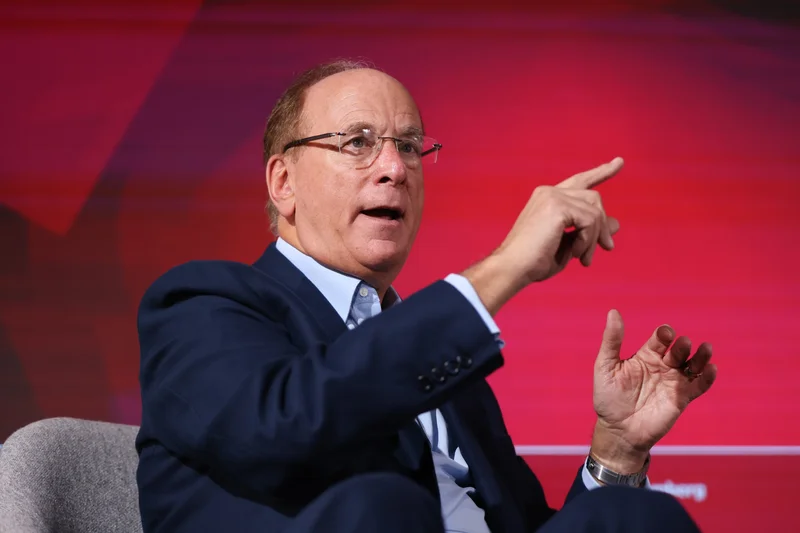The King is Dead, Long Live the King: Larry Fink's WEF Takeover is Not What You Think
The press release landed with the calculated quiet of a multi-billion dollar M&A deal. No fireworks, just the cold, hard text announcing that on August 17, 2025, BlackRock CEO Larry Fink will become the interim co-chair of the World Economic Forum. He’ll share the title with André Hoffmann of Roche, but let's be numerically honest—one of these co-chairs oversees a pharmaceutical dynasty, and the other oversees a significant fraction of the world’s invested capital.
The official narrative is one of careful, considered renewal. The WEF, we are told, is undergoing a “recalibration of its governance model” after an internal review cleared its 87-year-old founder, Klaus Schwab, of unspecified wrongdoing. The language is textbook corporate communications: “transparency,” “accountability,” “new perspectives.” Fink’s appointment, as detailed in reports like BlackRock CEO Larry Fink appointed as WEF interim co-chair - CryptoSlate, is framed as a move to “reassure stakeholders,” placing a steady, respected hand on the tiller during this transition.
On the surface, it’s a plausible story. Schwab, the ideological founder, steps back, and Fink, the ultimate capital markets operator, steps in to steward the organization. It’s presented as a changing of the guard. But when you strip away the PR varnish and look at the underlying data, this isn’t a story of renewal at all. It’s the story of a consolidation. The WEF isn't changing course; it's installing a more powerful engine.
The Illusion of Reform
The core discrepancy lies in the choice of the man meant to signal “new perspectives.” Larry Fink is not a reformer. He is the system. Appointing the CEO of BlackRock—a firm with trillions in assets under management—to lead a governance overhaul at the WEF is like asking the Federal Reserve chairman to lead a grassroots movement to audit the Fed. The very premise is a contradiction. The function of such a figure is to preserve and enhance the existing structure, not to fundamentally change it.
I've looked at hundreds of corporate governance changes, and this particular move is an outlier. Typically, when an organization genuinely wants to signal a break from the past, it brings in an outsider, someone with a track record of challenging the status quo. The WEF has done the precise opposite. It has elevated the single most powerful institutional voice in global finance to its highest echelon of leadership. This isn’t a recalibration; it’s an upgrade. The WEF is trading its academic, philosophical founder for the man who controls the world’s largest pool of capital.
The narrative of transparency is equally tenuous. The announcement followed an “internal review” of Schwab, the details of which remain entirely opaque. Who conducted this review? What were its terms of reference? What, precisely, were the allegations it investigated? We don't have that data. An organization claiming a new era of transparency that begins with a closed-door process and ends with the appointment of an insider’s insider is presenting a dataset with a significant credibility gap.

This leads to a fundamental question the official statements refuse to address: How can an organization credibly claim to be increasing accountability while installing a leader whose primary fiduciary duty is to a private, profit-seeking entity that is arguably the most systemically important financial institution on the planet? Where does the allegiance of the WEF’s co-chair lie when the interests of global stakeholders diverge from the interests of BlackRock’s shareholders?
The ESG and Crypto Vectors
To understand the trajectory this signals, we only need to look at Fink’s two most significant strategic pushes over the past decade: Environmental, Social, and Governance (ESG) investing and the institutionalization of crypto. These aren't just business initiatives; they are frameworks for reshaping how capital is allocated globally. With Fink at the WEF, these frameworks are now positioned to transition from corporate strategy to de facto global policy.
Under Fink’s leadership, BlackRock effectively forced the concept of ESG into the boardroom of nearly every major corporation on Earth. His annual letters became mandates, directing capital flows based on a set of non-financial metrics. Now, place that same man at the head of the table in Davos. The WEF becomes a powerful platform to legitimize and standardize this model, not as a market choice, but as a baseline for global economic participation. It’s a direct pipeline from the world’s largest asset manager to the world’s most influential policy forum.
Then there is the crypto vector. BlackRock’s launch of its spot Bitcoin ETF in early 2024 was the pivotal moment in the asset class’s journey toward mainstream acceptance. The fund gathered over $15 billion in assets in its first few months—to be more exact, in its first three months of trading. It was an act of profound institutional validation. Fink’s ascension at the WEF suggests the next phase of this integration. The conversation will no longer be about whether digital assets have a place in the global financial system, but how the existing system, directed by its primary incumbents, will manage and control them.
The WEF, under this new leadership, is poised to become the central clearinghouse for the rules governing these two transformative forces. It provides the political and social legitimacy that a private firm like BlackRock (a behemoth with over $10 trillion in AUM) cannot achieve on its own. It’s a symbiotic relationship: The WEF gets the operational and financial muscle of the world’s top capital allocator, and BlackRock gets the premier global platform to shape the policy environment in which its capital will be deployed. What does this fusion of institutional capital and global policy-making mean for the sovereignty of national governments in setting their own economic and technological agendas?
A Consolidation, Not a Recalibration
Let’s be precise. The appointment of Larry Fink is not a sign of the WEF’s decline or its search for a new identity. It is the logical conclusion of its evolution. The organization is moving from being a forum for the discussion of ideas to a command center for the execution of a specific economic vision. Klaus Schwab was the ideologue who built the platform; Larry Fink is the operator who can plug the entire global capital market directly into it.
The language of “interim” leadership and “governance recalibration” is procedural camouflage. This is a deliberate and strategic consolidation of power, fusing the agenda-setting influence of the WEF with the unparalleled capital-allocating power of BlackRock. We are witnessing the final stage of the WEF’s transformation from a talking shop for the elite into the central nervous system of institutional capital itself. The question isn't whether the WEF is changing. The question is whether we are prepared for what it is becoming.
